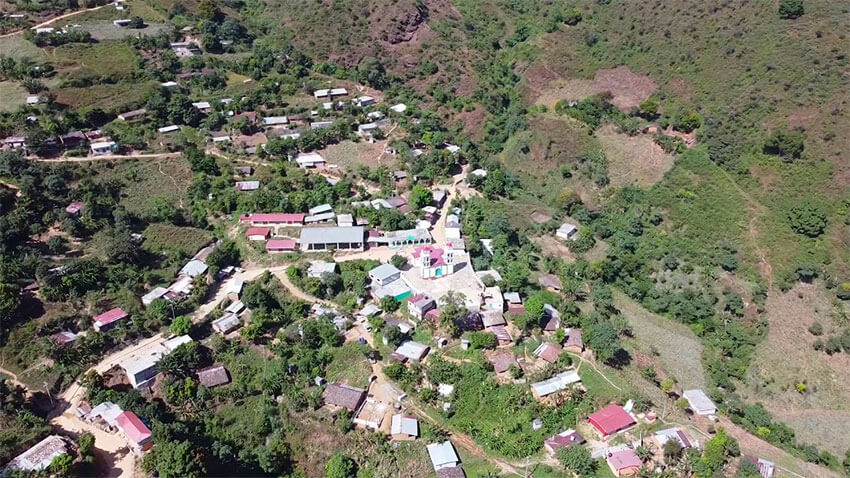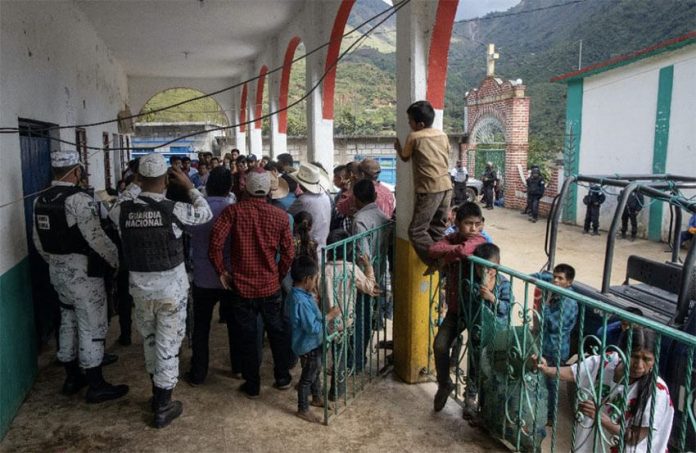A teenage Mixtec girl was jailed in the Montaña region of Guerrero this week after fleeing her home to avoid an arranged marriage.
The family of Anayeli, aged 14 or 15 according to differing media reports, had arranged for her to marry a slightly older boy on Monday. The girl’s mother agreed to a payment of 200,000 pesos (US $9,275) from the boy’s family, who hosted a party Sunday to celebrate the imminent nuptials.
A cow was slain and cooked to feed the guests, beer and soft drink flowed and a group of banda musicians provided entertainment. The boy’s parents also provided food and beverages for a gathering at Anayeli’s home last Friday.
Everything was set for a Monday wedding but on the morning of the big day Anayeli slipped out of her home in Joya Real, a community in the municipality of Cochoapa el Grande, and went into hiding at the home of a friend, identified as 15-year-old Alfredo “N.”
Anayeli’s disappearance prompted her family and that of her would-be husband to go to the community police to seek their assistance to locate her. Officers found the girl at Alfredo’s home and took both adolescents into custody, locking them up in police cells.

According to the Montaña Tlachinollan Human Rights Center, police told Anayeli she would only be released if she agreed to marry or her family compensated the boy’s family for the 56,000 pesos (US $2,600) it spent on the two pre-marriage events. They said her disappearance on the day of the wedding had “offended” the boy’s family.
Anayeli and Alfredo spent Monday night behind bars but personnel from the human rights center and the Guerrero Attorney General’s Office as well as state police arrived at the Joya Real police station on Tuesday morning and secured their release. The pair were subsequently placed in the custody of the DIF family services agency, the newspaper El Universal reported.
The state is investigating and community police, the local police chief and the parents of Anayeli and her would-be husband could face charges related to the girl’s arrest and intended marriage. The wedding didn’t take place and as a result the boy’s family didn’t make the 200,000-peso payment.
Neil Arias Vitinio, a lawyer with the human rights center, said that arranged – or forced – marriages involving young girls is a normalized practice in the Montaña region and for that reason many people were angered by Anayeli’s disappearance.
“They said, ‘Why did the girl do that if she already knows how things are here?’ [or] ‘She made a mockery of the [boy’s] family’ [or] ‘The girl accepted.’ But how can a girl have the capacity to take the decision to get married?” she asked.
Anayeli’s 14-hour incarceration came less than two months after a 15-year-old girl was held in a police lockup in Cochoapa el Grande for 10 days after fleeing the home of her father-in-law, who allegedly attempted to rape her on repeated occasions. Angélica was sold into marriage at the age of 11 but went to live with her in-laws after her husband emigrated to the United States.
The federal government’s women’s rights agency launched a strategy earlier this month to prevent violence against women and girls in the Montaña and Costa Chica regions of Guerrero and put an end to forced marriages. But according to Arias Vitinio there is no concrete plan nor sufficient funding to stop the violence and forced marriage problems.
“Signing an agreement isn’t sufficient. It’s necessary to go to the communities and speak with the people, we have to explain to them that marrying off girls and boys has consequences,” the lawyer said.
People below the age of 18 were banned from marrying across Mexico in 2019, but the sale of young girls into marriage continues to take place in some indigenous communities, especially in southern states such as Guerrero and Oaxaca.
During a trip to the Montaña region last month, President López Obrador rejected claims that the practice was widespread, asserting that a media campaign had made the sale of girls for marriage or prostitution appear to be a bigger problem than it really is.
“I’m not here to look at that because it’s not the rule,” he said. “There are a lot of moral, cultural and spiritual values in the communities. It might be the exception, but it’s not the rule.”
The Network for Children’s Rights in Mexico promptly condemned the federal government for downplaying the seriousness of Mexico’s child trafficking problem, including the sale of young girls, saying it is a crime that the Mexican state must investigate and eradicate.
With reports from El Universal and Reforma
